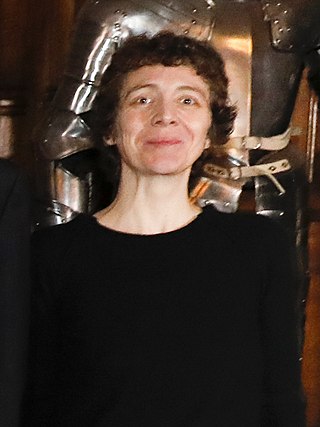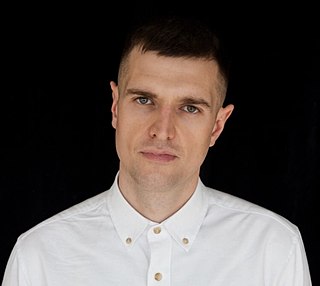Related Research Articles
The Glasgow dialect, also called Glaswegian, varies from Scottish English at one end of a bipolar linguistic continuum to the local dialect of West Central Scots at the other. Therefore, the speech of many Glaswegians can draw on a "continuum between fully localised and fully standardised". Additionally, the Glasgow dialect has Highland English and Hiberno-English influences owing to the speech of Highlanders and Irish people who migrated in large numbers to the Glasgow area in the 19th and early 20th centuries. While being named for Glasgow, the accent is typical for natives across the full Greater Glasgow area and associated counties such as Lanarkshire, Renfrewshire, Dunbartonshire and parts of Ayrshire, which formerly came under the single authority of Strathclyde. It is most common in working class people, which can lead to stigma from members of other classes or those outside Glasgow.
Pikey is a slang term, which is pejorative and considered by many to be a slur. It is used mainly in the United Kingdom and in Ireland to refer to people who are of the Traveller community, a set of ethno-cultural groups found primarily in Great Britain and Ireland. It is also used against Romanichal Travellers, Welsh Kale, Scottish Lowland Travellers, Scottish Highland Travellers, and Funfair Travellers.

Gregory Edward Hemphill is a Scottish–Canadian comedian, actor, writer, and director. Born in Springburn, an inner–city district in Glasgow, Scotland, Hemphill moved to Montreal, Quebec, Canada in the late 1970s before returning to Scotland in 1988.
"Chav", also "charver", "scally" and "roadman" in parts of England, is a British term, usually used in a pejorative way. The term is used to describe an anti-social lower-class youth dressed in sportswear. The use of the word has been described as a form of "social racism". "Chavette" is a related term referring to female chavs, and the adjectives "chavvy", "chavvish", and "chavtastic" are used to describe things associated with chavs, such as fashion, slang, etc. In other countries like Ireland, "Skanger" is used in a similar manner. In Canada, in the province of British Columbia they're known as "Surrey jacks". In Ontario, the term is "hoodman", an equivalent of the term "roadman" used in England. In Newfoundland, "skeet" is used in a similar way, while in Australia, "eshay" or "adlay" is used.
Kriss Donald was a 15-year-old white Scottish teenager who was kidnapped and murdered in Glasgow in 2004 by a gang of British men of Pakistani origin, some of whom fled to Pakistan after the crime. Daanish Zahid, Imran Shahid, Zeeshan Shahid and Mohammed Faisal Mustaq were later found guilty of racially motivated murder and sentenced to life imprisonment. A fifth man, Zahid Mohammed, pleaded guilty to kidnapping, assault and lying to police and was sentenced to five years in prison. He later went on to testify against the other four at their trials.

Sectarianism in Glasgow takes the form of long-standing religious and political sectarian rivalry between Catholics and Protestants. It is particularly reinforced by the fierce rivalry between Celtic F.C. and Rangers F.C., the two largest Scottish football clubs sometimes referred to as the Old Firm, whose support base is traditionally predominantly Catholic and Protestant respectively. A 2003 report for Glasgow City Council indicated that people clearly believe "sectarianism is still prevalent in Glasgow", but that members of the public were divided on the strength of the relationship between football and sectarianism.

"Billy Boys", also titled "The Billy Boys", is a loyalist song from Glasgow, sung to the tune of "Marching Through Georgia." It originated in the 1920s as the signature song of one of the Glasgow razor gangs led by Billy Fullerton and later became viewed to reflect the long-running sectarian religious hatred directed by some Protestants against Catholics in the city. It is associated in particular with Rangers F.C.

Karen Dunbar is a Scottish comedian, actress and writer. She first appeared on television on the BBC Scotland sketch comedy series Chewin' the Fat (1999–2002) and was subsequently given her own show by the channel, The Karen Dunbar Show (2003–2006).

Calton, known locally as The Calton, is a district in Glasgow. It is situated north of the River Clyde, and just to the east of the city centre. Calton's most famous landmark is the Barras street market and the Barrowland Ballroom, one of Glasgow's principal musical venues.

Easterhouse is a suburb of Glasgow, Scotland, 6 miles (10 km) east of the city centre on land gained from the county of Lanarkshire as part of an expansion of Glasgow before the Second World War. The area is on high ground north of the River Clyde and south of the River Kelvin and Campsie Fells.

Ruchazie is a neighbourhood in the Scottish city of Glasgow. It is situated to the north-east of the city, bordered by Craigend and Garthamlock to the east and the open ground of Hogganfield Park and Lethamhill Golf Course to the north. Ruchazie is separated from Cranhill to the south and Riddrie to the west by the M8 motorway, previously the route of the Monkland Canal.

Peter Mullan is a Scottish actor and filmmaker. He is best known for his role in Ken Loach's My Name Is Joe (1998), The Claim (2000), and all three series of the BBC comedy series Mum, in which he starred as Michael.

Barrowfield is a neighbourhood of Glasgow, Scotland, close to Celtic Park, home of Celtic F.C., which lies immediately to the east. It is bounded by the A89 road (Gallowgate) to the north and the A74 to the south.
Gang-related organised crime in the United Kingdom is concentrated around the cities of London, Manchester and Liverpool and regionally across the West Midlands region, south coast and northern England, according to the Serious Organised Crime Agency. With regard to street gangs the cities identified as having the most serious gang problems, which also accounted for 65% of firearm homicides in England and Wales, were London, Birmingham, Manchester and Liverpool. Glasgow in Scotland also has a historical gang culture with the city having as many teenage gangs as London, which had six times the population, in 2008.

Ford John Kiernan is a Scottish actor, comedian and writer. He is best known for his work with Greg Hemphill on the BBC Scotland sketch comedy series Chewin' the Fat (1999–2005) and the sitcom Still Game. He also starred as Archie Henderson in Dear Green Place (2007–2008) and as Colin Holliday in Happy Hollidays (2009).

There are several types of mass media in Scotland: television, cinema, radio, newspapers, magazines, game design and websites. The majority of Scotland's media is located in Glasgow, the countries largest city, which serves as the HQ for much of the countries major media employers such as broadcasters BBC Scotland and STV, radio services including BBC Radio Scotland, Clyde 1 and Pure Radio Scotland. Game design and production company, Rockstar North, has its international offices in the countries capital city, Edinburgh.
William Knox was a Scottish author, journalist and broadcaster, best known for his crime novels and for presenting the long-running STV series Crimedesk.

The Glasgow razor gangs were violent gangs that existed in the East End and South Side of Glasgow, Scotland in the late 1920s and 1930s and were named after their weapon of choice. H. Kingsley Long's novel No Mean City (1935) contains a fictionalised account of these gangs.
Eshay is a slang expression associated with an Australian urban youth subculture that originated from Western Sydney in the late 1980s, but has brought into the mainstream since the late 2010s and the 2020s, partially due to News Corporation coverage.

Graeme Armstrong is a Scottish author best known for his debut novel, The Young Team. The novel won the 2021 Betty Trask Award and Somerset Maugham Award, and was Scots Language Awards 'Scots Book of the Year' in the same year. The Young Team is currently being adapted for television by Synchronicity Films.
References
- ↑ "ned". Dictionary of the Scots Language. Archived from the original on 27 August 2011. Retrieved 25 August 2011.
- ↑ BBC News - Ned arrives - it's official Archived 7 June 2004 at the Wayback Machine , 12 July 2001, retrieved 8 May 2006
- 1 2 BBC News - Neds make it into the dictionary Archived 19 May 2006 at the Wayback Machine , 9 June 2005, reporting definition in Collins English Dictionary; retrieved 8 May 2006
- ↑ Middle class kids 'attracted to ned and chav culture' Archived 12 November 2018 at the Wayback Machine . BBC News. 10 September 2012. Retrieved 10 August 2013.
- ↑ "Oxford English Dictionary, definition of "ned", retrieved 1 June 2011". Archived from the original on 20 July 2011. Retrieved 1 June 2011.
- ↑ Sillitoe, Percy (1955). Cloak without dagger. p. 143.
- ↑ Stirling Observer counties edition, "Stop the Rise of the teen-ager" July 1960
- ↑ "The chavs and chav-nots in a bitter war of words". Scotsman.com. 29 August 2007. Retrieved 3 February 2011.
Knox, Bill (1962). Little drops of blood. Published for the Crime Club by Doubleday. Archived from the original on 28 February 2017. - ↑ Knox, Bill (1975). Rally to kill . Published for the Crime Club by Doubleday.
neds.
- ↑ Dove, George N. (1982). The police procedural . Bowling Green, Ohio: Bowling Green University Popular Press. pp. 79–80. ISBN 0-87972-188-X.
- ↑ Christie, Stuart (2002). My Granny Made Me an Anarchist. Oil & Gas USSR. pp. 87–88. ISBN 1-873976-14-3.
- ↑ "Holyrood urged to protect 'neds'". BBC News. 5 June 2003. Archived from the original on 7 December 2008. Retrieved 6 February 2011.
- ↑ Dr Alistair Fraser (2011). "Programme Note: NEDS". Glasgow Film Theatre. Archived from the original on 26 July 2011. Retrieved 5 February 2011.
- ↑ Andrew Denholm, Education Correspondent (21 January 2011). "Study shows 'neds display identity through their clothes and accents'". The Herald (Glasgow) . Archived from the original on 8 October 2012. Retrieved 6 February 2011.
Fiona MacLeod (21 January 2011). "'Neds' have their own style of pronunciation to distinguish themselves, study says - Scotsman.com News". The Scotsman . Edinburgh. Retrieved 6 February 2011.
"PME School Of English : Neds - it's all in the voice". Birmingham City University. 20 January 2011. Archived from the original on 14 March 2012. Retrieved 6 February 2011.
Robert Lawson. "University of Glasgow :: Postgraduate Research :: Robert Lawson - University of Arizona". Archived from the original on 22 July 2009. Retrieved 6 February 2011. and Full Report Archived 24 September 2012 at the Wayback Machine - ↑ Raine, Adrian. "21st Century Television's Faltering Moral Compass". The Economist . 8 April 2009.
- ↑ OED online, retrieved 21/3/11
- ↑ Beal, Joan C. (2006). Language and Region (Intertext). New York: Routledge. pp. 53–54. ISBN 0-415-36601-1.
- ↑ Traynor, Frances (7 August 2002). "BBC Scotland finally takes the wraps off its new show, River City". Daily Record. Archived from the original on 19 January 2018. Retrieved 19 January 2018.
- ↑ "Peter Mullan's Neds wins film awards". BBC News. 26 September 2010. Archived from the original on 29 June 2011. Retrieved 15 March 2012.
- ↑ Book review: The Young Team, by Graeme Armstrong, Stuart Kelly, The Scotsman, 5 March 2020
- ↑ The Young Team by Graeme Armstrong review – a swaggering, incendiary debut, Jude Cook, The Guardian, 13 March 2020